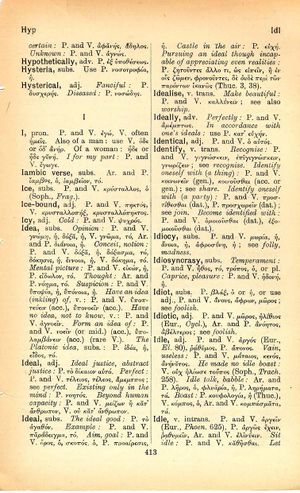idea
έγ', ὦ ταλαίπωρ', αὐτὸς ὧν χρείᾳ πάρει. τὰ πολλὰ γάρ τοι ῥήματ' ἢ τέρψαντά τι, ἢ δυσχεράναντ', ἢ κατοικτίσαντά πως, παρέσχε φωνὴν τοῖς ἀφωνήτοις τινά → Wretched brother, tell him what you need. A multitude of words can be pleasurable, burdensome, or they can arouse pity somehow — they give a kind of voice to the voiceless | Tell him yourself, poor brother, what it is you need! For abundance of words, bringing delight or being full of annoyance or pity, can sometimes lend a voice to those who are speechless.
English > Greek (Woodhouse)
subs.
opinion: P. and V. γνώμη, ἡ, δόξα, ἡ, V. γνῶμα, τό, Ar. and P. διάνοια, ἡ.
conceit, notion: P. and V. δόξα, ἡ, δόξασμα, τό, δόκησις, ἡ, ἔννοια, ἡ, V. δόκημα, τό.
mental picture: P. and V. εἰκών, ἡ, P. εἴδωλον, τό.
thought: Ar. and P. νόημα, τό.
suspicion: P. and V. ὑποψία, ἡ, ὑπόνοια, ἡ.
have an idea (have an inkling) of v.: P. and V. ὑποπτεύειν (acc.), ὑπονοεῖν (acc.).
have no idea, not to know, v.: P. and V. ἀγνοεῖν.
form an idea of: P. and V. νοεῖν (or mid.) (acc.), ὑπολαμβάνειν (acc.) (rare V.).
the Platonic idea, subs.: P. ἰδέα, ἡ, εἶδος, τό.
Latin > English (Lewis & Short)
ĭdĕa: ae, f., = ιδέα,
I a (Platonic) idea, archetype, Sen. Ep. 58 med. (in Cic. Or. 3, 10; id. Ac. 1, 8, 30; id. Tusc. 1, 24, 58, as Greek).
Latin > French (Gaffiot 2016)
ĭdĕa,¹³ æ, f., idée [de Platon, type des choses : Sen. Ep. 58, 18 ; [Cicéron garde le mot grec ἰδέα : Cic. Ac. 1, 20 ; Tusc. 1, 58 ].
Latin > German (Georges)
idea, ae, f. (ἰδέα), das Urbild, die Idee, das Ideal, Sen. ep. 58, 18 u. 1926. – / Sen. ep. 65, 7 u. in den meisten Ausgaben des Cicero griech. geschrieben, aber in vielen Handschriften latein.; vgl. idos.
Spanish > Greek
ἐνθύμιος, ἐννόημα, διάνοια, ἔννοια, διανόημα, ἐνθύμημα, διανόησις, ἐνθύμησις

